W
hat you do online. When you’re home. When you’re not. Where you shop. Who you friend and date. What apps you download and how you use them. Your age, sex, income, credit score, and location day and night. We trade thousands and thousands of points of data like this every day to use websites like Facebook, services like Gmail and apps like Tinder.
Personal data has become the currency of the Internet. Things are free online because you’re paying with your data. Companies mine that data, and then monetize it through advertising.
Big data collectors like Google and Facebook record not only what you do on their sites, but also elsewhere on the Internet through tracking devices like browser cookies. They combine all that information with data they acquire and purchase from third parties. The result is a big ball of data about you that can be used by advertisers for marketing.
Most smaller data collectors, like say a free smartphone game, sell the data they gather to brokers. Companies that have platforms to reach eyeballs — like Google and Facebook — roll up their own balls of user data and charge advertisers to target marketing to its users based on that information.
In his state of the state address, Gov. Gavin Newsom said consumers should make money from all their data.
“I’ve asked my team to develop a proposal for a new ‘data dividend’ for Californians, because we recognize that your data has value and it belongs to you,” he said.
This idea isn’t new.
Private companies like Datacoup and Meeco have tried to get consumers to sell their data directly to advertisers. The problem these companies have run into is that even selling even your most personal, intimate details won’t actually bring you that much money.
That’s because one individual’s information isn’t worth that much on its own. Even U.S. consumers, who, because of their buying power, have the most valuable personal information in the world, have only been able to make tens of dollars a month on these data marketplaces.
Data really starts to gain value when companies have information on millions or billions of users, and when they control the mediums for advertisers to access those users.

